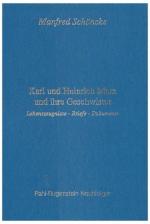|
This section contains 1,656 words (approx. 6 pages at 300 words per page) |

|
Nietzche and Marx's Views on Human Potential
Summary: Frederich Nietzche and Karl Marx took opposite view on human potential. Nietzche wrote that man achieves potential as an individual because groups of humans will temper great ideas. Marx wrote that humans can achieve greatness only by working together; there is strength in comradeship and weakness in individuality.
Trying to pursue the maximum human potential mirrors the futility of counting to the largest number. Human potential is unbounded as if it were a numerical value. The moment a summit appears to be within reach, a greater one surfaces with the same unattainable glare the conquered once held. Man prides himself in dominating new heights and although the biggest number will never be counted, he will never stop counting. The limitless potential of humans stems from an instinct to continually desire more.
Regardless of how unbounded human potential may be, the rate at which it grows relies on the quality of humans that wish to maximize it. Friedrich Nietzsche in the book On the Advantage and Disadvantage of History for Life and Karl Marx along with Frederick Engels in The Communist Manifesto comment on what qualities are necessary for the improvement of human life. They all clearly...
|
This section contains 1,656 words (approx. 6 pages at 300 words per page) |

|


